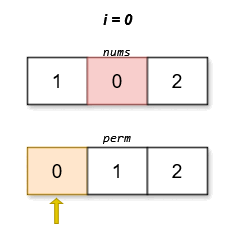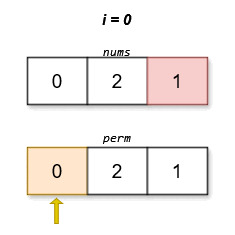Difficulty: hard
Link: https://leetcode.com/problems/find-the-minimum-cost-array-permutation/
Contains PNG: No
You are given an array nums which is a permutation of [0, 1, 2, ..., n - 1]. The score of any permutation of [0, 1, 2, ..., n - 1] named perm is defined as:
score(perm) = |perm[0] - nums[perm[1]]| + |perm[1] - nums[perm[2]]| + ... + |perm[n - 1] - nums[perm[0]]|
Return the permutation perm which has the minimum possible score. If multiple permutations exist with this score, return the one that is lexicographically smallest among them.
Example 1:
Input: nums = [1,0,2]
Output: [0,1,2]
Explanation:
The lexicographically smallest permutation with minimum cost is [0,1,2]. The cost of this permutation is |0 - 0| + |1 - 2| + |2 - 1| = 2.
Example 2:
Input: nums = [0,2,1]
Output: [0,2,1]
Explanation:
The lexicographically smallest permutation with minimum cost is [0,2,1]. The cost of this permutation is |0 - 1| + |2 - 2| + |1 - 0| = 2.
Constraints:
2 <= n == nums.length <= 14numsis a permutation of[0, 1, 2, ..., n - 1].
- 1. The score function is cyclic, so we can always set
perm[0] = 0for the smallest lexical order. - 2. It’s similar to the Traveling Salesman Problem. Use Dynamic Programming.
- 3. Use a bitmask to track which elements have been assigned to
perm.
class Solution {
public:
vector<int> findPermutation(vector<int>& nums) {
}
};class Solution {
public int[] findPermutation(int[] nums) {
}
}class Solution:
def findPermutation(self, nums: List[int]) -> List[int]:

